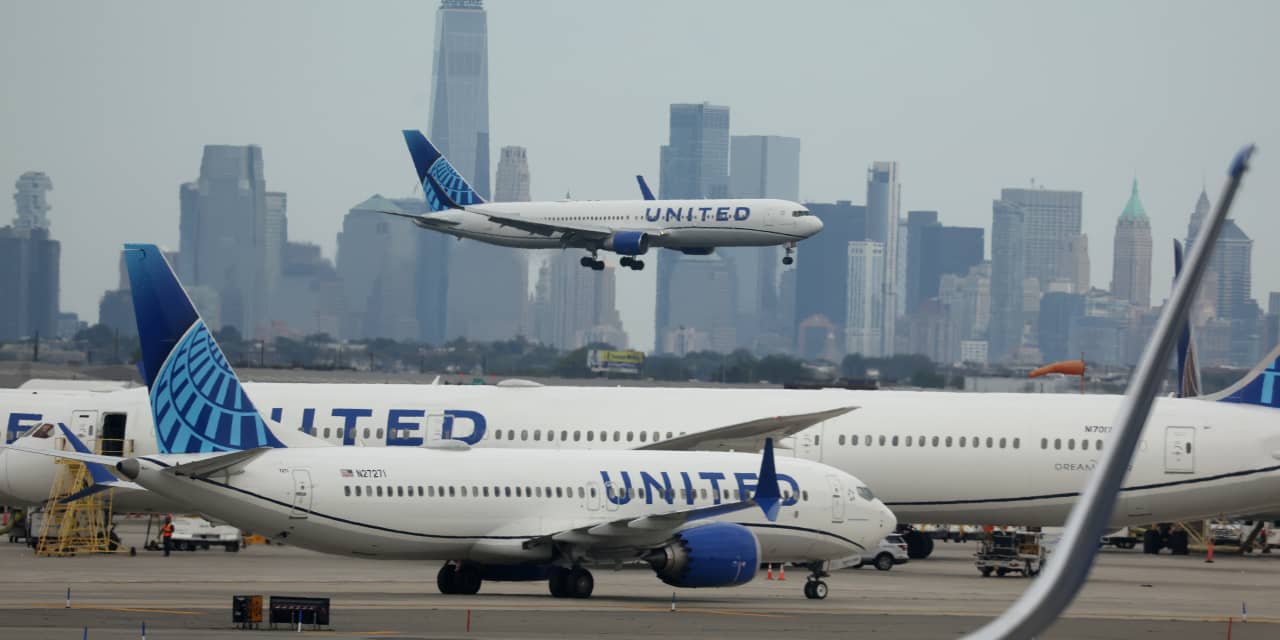United Airlines
(ticker: UAL) reported “strong and steady domestic demand” and a record-setting international performance for the third quarter, surpassing analysts’ expectations.
But shares fell after it said fourth-quarter results would be hurt by higher fuel costs and the continued suspension of its flights to Tel Aviv because of the Israel-Hamas War.
United said it expects fourth-quarter earnings of about $1.80 a share if service to Tel Aviv remains suspended through October, and about $1.50 a share if Tel Aviv flights are suspended for the rest of the year. Wall Street expected earnings of $2.09 a share.
In addition, United is projecting average fuel cost per gallon of $3.28 in the fourth quarter, up 11% from $2.95 in the third quarter.
United shares fell 4.5% in late trading on Tuesday, after rising 1.5% in regular trading.
United isn’t the only U.S. or global carrier to stop service to Israel, but it had more flights to Israel than other U.S. airlines, with service from Washington, D.C., Newark, and San Francisco, CNBC reported.
The news comes after Delta Air Lines (DAL) trimmed its 2023 outlook. Delta now expects earnings of between $6 and $6.25 a share, down from a previous range of $6 to $7.
Chicago-based United reported third-quarter revenue of $14.5 billion, slightly above the $14.4 billion expected, and above last year’s $12.9 billion. Net income of $1.1 billion, or $3.42 a share, beat the $942 million, or $2.86 a share, in last year’s third-quarter.
Adjusted earnings of $3.65 a share beat the $3.38 a share expected, but analysts were looking for more than just numbers.
In preparation for an expected surge in international travel, United earlier this month ordered 110 additional aircraft: 50 Boeing (BA) Dreamliner 787-9s aircrafts to be delivered from 2028 to 2031, and 60 Airbus (AIR) A321neos units for delivery between 2028 to 2030.
The carrier also signed options for up to 50 more
Boeing
787s and purchase rights for an additional 40 Airbus A321neo aircrafts by the end of the decade. United said it expects to take delivery of about 800 new narrowbody and widebody aircraft between 2023 and 2032.
United’s stock is up 6.4% so far this year, and up 7.7% over the past 12 months.
American Airlines
(AAL) is due to report Thursday. The carriers are likely to be among the better performers in the sector, given their international exposure and lower reliance on softening domestic demand.
However, that doesn’t necessarily mean the stocks will rise.
Delta’s earnings were actually pretty good, all things considered, and yet the shares still fell more than 5% in the following two trading days. The carrier beat earnings expectations, posted record third-quarter revenue, and signaled that robust travel demand is continuing into the December quarter. Business travel continues to improve and trans-Atlantic revenue jumped 34%, with the largest revenue per available seat mile in the company’s history.
However, all that wasn’t enough to lift shares, which have now fallen 30% since their July peak. Higher jet fuel prices in the third quarter and rising oil prices in the near term as a result of the Israel-Hamas war are among the factors keeping pressure on airline stocks.
While Delta’s seemingly strong earnings report met with disappointment among investors, United also faces a daunting task when it comes to boosting its shares after earnings.
United’s current guidance is for between $11 and $12 per share but analysts are already skeptical of that—with a consensus of $9.96, according to FactSet.
If larger carriers can’t boost their shares by posting strong profits, record revenue, and signaling robust demand, spare a thought for the low-cost carriers including
JetBlue Airways
(JBLU),
Spirit Airlines
(SAVE), and
Frontier Airlines
(ULCC), which are all expected to post a loss.
“The tide has turned for U.S. carriers. Low-cost carriers dependent on domestic leisure travel are struggling to maintain current levels of profitability while network carriers with international exposure are showing robust profit growth,” Third Bridge analyst Christopher Raite said.
There is likely more pain ahead for the low-cost airlines, J.P. Morgan’s Jamie Baker said in a note last week. “Any U.S. airline that fails to achieve third quarter profitability (SAVE, ULCC, JBLU) is deeply indebted to unveil meaningful course corrections, and failing to do so will potentially lead to further equity shellacking,” he said.
United executives will discuss third-quarter financial results, as well as the airline’s financial and operational outlook for fourth quarter and full year 2023 and beyond, at a conference call at 9:30 a.m. Central Time/10:30 a.m. Eastern Time on Wednesday.
Write to Callum Keown at [email protected]
Read the full article here







